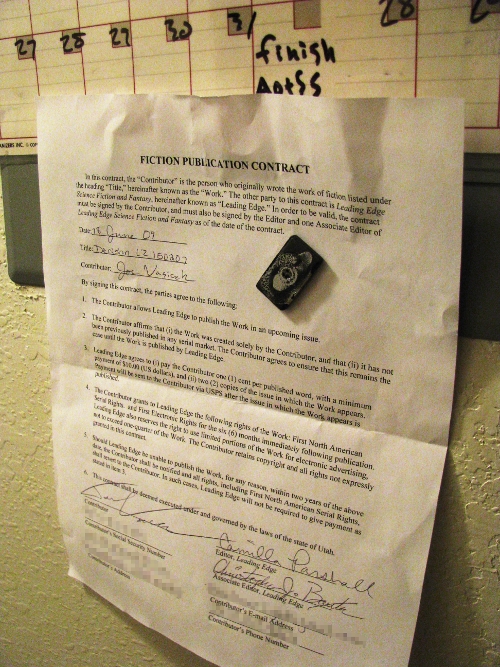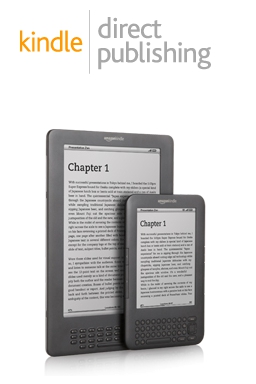 Sorry I haven’t been posting much recently; I came down with a nasty fever this week, and I’ve spent the last two days recovering.
Sorry I haven’t been posting much recently; I came down with a nasty fever this week, and I’ve spent the last two days recovering.
It really sucks, because my two temp jobs just finished, and I was hoping to get into another writing routine. The jobs were sucking up all my time, though it was definitely awesome to have money flowing in.
Anyhow, I caught Brandon Sanderson after his 318 class and asked him about submitting to agents while I’ve got my full ms out. He said I shouldn’t do it; that it would look bad if I had to turn down another request because it’s already out. So for now, I’m just going to sit on it and send out Genesis Earth to other agents.
 Genesis Earth keeps getting turned down, but the vibe I get is that it’s more because of the agents’ tastes, not because of the poor quality of the book. So far, I’ve gotten one request for a full, one request for a partial, two personalized rejections, and several variations on “I don’t feel I’m the right agent.”
Genesis Earth keeps getting turned down, but the vibe I get is that it’s more because of the agents’ tastes, not because of the poor quality of the book. So far, I’ve gotten one request for a full, one request for a partial, two personalized rejections, and several variations on “I don’t feel I’m the right agent.”
Even if all of the latter are just nice standard form rejections, that’s enough to tell me that Genesis Earth isn’t a crappy book. So I’ve been thinking, if I run the rounds and fail to find an agent or a publisher, maybe I should take the plunge and publish it for $2.99 as an e-book on Amazon.
Speculation about e-publishing is rampant, and opinions are wildly mixed right now. According to Joe Konrath, everyone (including new writers) should self publish their works–to wait even a day is to give up large amounts of potential earnings. According to Dave Wolverton, however, new writers should definitely not self publish, but try to break in through traditional publishing with as big of a deal as they can possibly get. Both authors have had huge self-publishing successes, so which is right?
Well, I read an interesting guest post by Lee Goldberg on Joe Konrath’s blog that takes the middle ground: start out with a traditional publishing deal, in order to build a name for yourself, but self-publish a couple of e-book lines shortly thereafter.
So far, that seems to make the most sense to me. The science fiction and fantasy community is very tight-knit, and I don’t see myself becoming a major part of it through self-publishing alone. At the same time, it’s very difficult to make a living through traditional publishing in these genres, so once I’ve built up something of a name and a fan-base, it would be good to start self-publishing a couple of e-book lines.
But then again, why not try it out now with Genesis Earth? Well, a couple of reasons. I’m worried that self-publishing would make me look bad when I submit my other stuff. E-book sales tend to take a long time to build momentum, so even though the starting costs are low, the returns don’t start coming in until later–if they come at all. And that’s the second thing I’m worried about–that my stuff will get buried under the flood of drivel that’s swamping Amazon and other e-publishers right now.
 The main reason, though, is that I feel I need to do more research to figure out what’s going on. Probably the most valuable thing I can do is get an e-reader and dive into the market from the consumer end, just to figure out how the system works. Without some hands-on experience and a good working knowledge of the field, I’m probably not ready to take the leap.
The main reason, though, is that I feel I need to do more research to figure out what’s going on. Probably the most valuable thing I can do is get an e-reader and dive into the market from the consumer end, just to figure out how the system works. Without some hands-on experience and a good working knowledge of the field, I’m probably not ready to take the leap.
In the meantime, I’ll keep trying to break in through the traditional route. I might not make as much money as quickly this way, but I hopefully will build my name faster–and at this point, that’s more important to me than revenues.
Lee Goldberg’s opinion has long been mine. The great advantage to being published in traditional magazines or at a traditional publishing house is exposure and professional respect. Once you build on that, you’ll have a lot of credibility for selling ebooks. Keep in mind that Dean Wesley Smith and Joe Konrath didn’t start out self-published; they had traditional careers for a long time before that.
There’s also the question of time. I’d rather spend my free hours writing than learning how to do epublishing, even though I could probably master it in ten hours. That’s my writing budget for a whole week, after all.
And, math: even a token sale to a professional magazine is probably $10. That’s about 14 stories sold at 99 cents and 70% royalties, and you have to convince 14 people rather than one, token-paying editor. I’m entirely confident I could convince token markets to buy my goods… I’d just prefer to get rejected by Asimov’s, Clarkesworld, etc.
Whew! I’ve been meaning to write a post about that for a while. It seems, instead, I’ve just written it all in a comment here.
No offense to Sanderson, but last time he queried was back in 2005 at the latest. In the past 6 years, things have changed A LOT. Barely any agents allowed submission by email back then, facebook was just getting started, twitter didn’t exist, and no one imagined the e-readers would take off as they have done. Sanderson’s way of querying no longer applies to 2011’s ways of doing it.
Also, you wouldn’t be turning down any agents if they asked for the full since there is nothing wrong with handing out the full to every single agent that asks, even at the same time. The old rule has changed. Unless the agent asks for an exclusive, they very much expect that the full they currently have is most likely out on other agents’ desks as well. When an agent asked for my book, she told me to let her know the instant if I got an offer of representation from another agent. She had already assumed other agents had my book and she wanted a chance to read it before I got snatched up by someone else.
I say your wasting time, money, and your potential career by not sending the full out to multiple agents and trying to adhere to an old rule system. In fact, this post itself shows the changing of the old to the new. Self-publishing is fast losing its negative stigma and, in fact, I could see it easily becoming THE way to get published in the next 5 to 10 years (assuming nothing cooler/more efficient gets invented before then).
So stop being a dithering Hamlet and start submitting!
Aneeka said all my thoughts on Sanderson’s opinion, so I’ll just say “amen”
As for self-publishing, it still has a stigma for me. Also, you have to realize that you’re fighting an uphill battle. Joe Konrath makes a lot of assumptions – such as the 1000 e-books a month is sustainable. Also, that you’re losing money each month by not submitting. It’s more of a deferment than losing, since sales will eventually taper off. (unless by some miracle it suddenly becomes as hot as Hunger Games). His point about the cheaper price point, though, does have merit.
Also, these authors are posting books that have already proven that they have enough writing skills that people will pay for them, and have been through professional editing services. Goldberg makes a very good argument for both sides of self-publishing, and I like his stance.